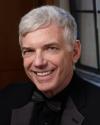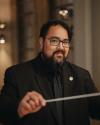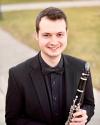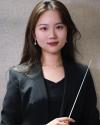The Wind Ensemble (Timothy Salzman, director) and Symphonic Band (David Stewart, Yuman Wu, directors) present a program of music by Ricardo Mollá, Yasuhide Ito, Ryan George, Zhou Tian, John Mackey, and others. With special guest, artist-in-residence John DiCesare, tuba.
Program
University of Washington Symphonic Band
David Stewart, Yuman Wu, conductors
Caccia and Chorale (1976) - Clifton Williams (1923-1976)
Aurora Awakes (2009) - John Mackey (b. 1973)
Machu Picchu (2005) - Satoshi Yagisawa (b. 1975)
University of Washington Wind Ensemble
Timothy Salzman, conductor
Amaia (2024) – Ricardo Mollá (b. 1992)
1. Gazteluga Txe
2. Amaia’s Letter
3. The Final Element
John DiCesare, tuba
Gloriosa (1990) – Yasuhide Ito (b. 1960)
1. Oratio
2. Cantus
3. Dies Festus
David Stewart, conductor
Program Notes
Composer Clifton Williams provided the following program note on this work: “While it remains open to question whether music can convey any message other than a purely musical one, composers often tend to attempt philosophical, pictorial, or other aspects within a musical framework. Such is the case with Caccia and Chorale, two title words borrowed from Italian because of their allegorical significance. The first, Caccia, means hunt or chase, and is intended to reflect the preoccupation of most people in the world with a constant pursuit of materialism. The Chorale is, by contrast, an urgent and insistent plea for greater humanity, a return to religious or ethical concepts.”
John Mackey holds a Master’s degree from The Juilliard School and a Bachelor of Fine Arts degree from the Cleveland Institute of Music, where he studied with John Corigliano and Donald Erb, respectively. His works have been performed at the Sydney Opera House; the Brooklyn Academy of Music; Carnegie Hall; the Kennedy Center; Weill Recital Hall; Jacob's Pillow Dance Festival; Italy's Spoleto Festival; Alice Tully Hall; the Joyce Theater; Dance Theater Workshop; and throughout Italy, Chile, Japan, Colombia, Austria, Brazil, Germany, England, Australia, New Zealand, and the United States. John has received numerous commissions from the Parsons Dance Company, as well as com¬missions from the Cleveland Orchestra Youth Orchestra, New York City Ballet’s Cho¬reographic Institute, the Dallas Theater Center, the Alvin Ailey Dance Company, the New York Youth Symphony, Ailey 2, Concert Artists Guild, Peridance Ensemble, and Jeanne Ruddy Dance, among many others.
Aurora Awakes is a piece about the heralding of the coming of light, with the com¬poser’s principal inspiration coming from Aurora, the Roman goddess of the dawn, a mythological figure frequently associated with beauty and light. Built in two substantial sections, the piece moves from a place of remarkable stillness to an unbridled explosion of energy – from darkness to light, placid grey to startling rainbows of color. Direct musical quotation from two diverse sources are also found in the work. The first is an ostinato-based on the familiar guitar introduction to U2’s “Where The Streets Have No Name.” Though the strains of The Edge’s guitar have been metamorphosed into the insistent repetitions of keyboard percussion, the aesthetic is similar – a distant proclama¬tion that grows steadily in fervor. The other quotation is a sly reference to Gustav Holst’s First Suite in Eb for Military Band. The brilliant Eb chord that closes the Chaconne of that work is orchestrated (nearly) identically as the final sonority of Aurora Awakes – producing an unmistakably vibrant timbre that won’t be missed by aficionados of the repertoire.
Aurora Awakes won both the American Bandmasters Association’s 2009 Ostwald Prize and the National Band Association’s 2009 William D. Revelli Award.
—program note by Jake Wallace
Satoshi Yagisawa graduated from Musashino Academia Musicae's Composition Department and completed the master's program at the same university's Graduate School of Music Research. He is currently an associate professor at Kobe College and a visiting professor at Nagoya University of Arts, where he teaches composition, wind music and music theory. His major works are well-loved not only in Japan but also in the United States, Europe, and various Asian countries. On November 9, 2019, his piece was chosen for the "Fanfare to Welcome Their Majesties" at the National Celebration for the Enthronement of the Emperor and Empress, and his music was also selected for the opening ceremony of the Tokyo 2020 Paralympics. One of his compositions was chosen as a test piece for the historically prestigious Certamen Internacional de Bandas de Música Ciudad de Valencia in Spain. He received the 21st Japan Wind and Percussion Academy Award in the Composition and Arrangement category in 2011 and the JBA Shitaya Encouragement Award that same year.
Explaining the significance of Machu Picchu begins with remembering the Incan empire at its zenith, and its tragic encounter with the Spanish conquistadors. The great 16th century empire that unified most of Andean South America had as its capital the golden city of Cuzco. Francisco Pizarro, while stripping the city of massive quantities of gold, in 1533 also destroyed Cuzco’s Sun Temple, shrine of the founding deity of the Incan civilization. While that act symbolized the end of the empire, 378 years later an archaeologist from Yale University, Hiram Bingham, rediscovered “Machu Picchu,” a glorious mountaintop Incan city that had escaped the attention of the invaders. At the central high point of the city stands its most important shrine, the Intihuatana, or “hitching post of the sun,” a column of stone rising from a block of granite the size of a grand piano, where a priest would "tie the sun to the stone" at winter solstice to ensure its seasonal return. Finding the last remaining Sun Temple of a great city inspired the belief that perhaps the royal lineage stole away to his holy place during Pizarro’s conquest. After considering these remarkable ideas, I wished to musically describe that magnificent citadel and trace some of the mysteries sealed in Machu Picchu’s past. Three principal ideas dominate the piece: 1) the shimmering golden city of Cuzco set in the dramatic scenery of the Andes, 2) the destructiveness of violent invasion, and 3) the re-emergence of Incan glory as the City in the Sky again reached for the sun.
—program note by composer
Ricardo Mollá is a Spanish trombonist, composer and conductor living in New York City.
He received his bachelor’s degree in trombone at the Conservatorio Superior de Música Oscar Esplá in Alicante (Spain) and the Hochschule für Musik, Theatre und Medien Hannover (Germany) with Javier García and Jonas Bylund, respectively. Personally invited by Joseph Alessi, principal trombone of the New York Philharmonic, he was awarded a scholarship by the Artists’ Society of Spain (AIE) and Foundation JONDE-BBVA to study at the prestigious Juilliard School of New York where he is [2024] pursuing a master’s degree in classical music. His debut as a soloist was in Carnegie Hall (Recital Weill) after winning the first prize in the New York Artist International Competition. As a trombone soloist, he has performed in the Lucerne Festival (Switzerland), the ManiFeste IRCAM of Paris (France), the Spanish Brass Festival (Spain), the Recontre International des Cuivres (Belgium), Letnia Akaemia (Poland), the FOCUS! Festival of New York (U.S.A.), and the International Trombone Festival. He has collaborated with many professional orchestras, playing under the baton of conductors such as Pierre Boulez, Simon Rattle, Riccardo Chailly, Fabio Luisi, Alan Gilbert, Heinz Holliger, Matthias Pintscher, David Robertson, and Esa-Pekka Salonen, among others. In the field of pedagogy, Mollá has been invited to give courses, masterclasses, and talks in Europe, North America, South America and Asia. Ricardo currently [2024] splits his time between working as a trombone soloist, composing and giving talks about stage fright. Throughout his career Ricardo has received awards in more than twenty national and international competitions, including the Concurso Permanente Juventudes Musicales of Spain, the INTERMUSICA International Competition (Austria), Die Hannoversche Börse der Musiktalente (Germany), the Recontre International des Cuivres de l’IMEP (Belgium), the Concorso Internationale Citta di Chieri (Italy), and the International Virtuoso Competition (USA).
Amaia is a story of transformation and personal growth set on the Cantabrian coast of northern Spain. The young protagonist, Amaia, embarks on a dreamlike journey through emblematic places such as Gaztelugatxe and San Sebastián, with the aim of learning to control the four natural elements: water, earth, fire, and air. Throughout her adventure, she encounters mythical beings from Basque mythology, such as the Lamiak, Olentzero, and Basajaun, who teach her valuable lessons about the elements and life. The plot reaches its climax in a battle against a devastating storm at the ‘Peine del Viento’, where Amaia fights not only against the forces of nature but also against the emotional pain caused by the loss of her father, who died at sea. This battle symbolizes her internal struggle and her process of overcoming. The story of Amaia is an allegory of the maturation process and facing pain, showing how, through the overcoming of external and internal challenges, a girl can find the strength to move forward and renew herself.
The work was commissioned by Joseph Awad and dedicated to Carol Jantsch, principal tubist of the Philadelphia Orchestra.
—program note by composer
Yasuhide Ito, professor at Senzoku Gakuen College of Music, has earned international acclaim for his compositional endeavors. He has more than 1000 works including more than 90 wind band works. "Gloriosa” (1990 Ongaku No Tomo Sha; Bravo Music, international distributor) is one of the most frequently performed masterworks in the world, having the distinction of appearing in a standard Japanese high school music textbook. “Festal Scenes” (TRN) saw its US premiere with Ito himself conducting, marking his first international appearance at the 1987 ABA-JBA joint convention. Ito’s compositional talent covers a variety of musical media. His piano ensemble series, “Guru-guru Piano” (Ongaku No Tomo Sha, 8 volumes) expands the scope of four-handed performance. His 2001 opera “Mr. Cinderella” received much critical acclaim and greatly impacted the Japanese opera scene. By request from his hometown of Hamamatsu, he composed music for the official city song rededicated in 2007. In honor of those affected by the tragic East Japan Earthquake, Ito collaborated with famous poet Ryoichi Wago, offering songs of gifts and prayer. His kindness and generosity through music has touched many lives. Ito’s distinguished musical career includes guest conducting the Tokyo Kosei Wind Orchestra for their ‘Asian Concert Tour 2002’ on behalf of maestro Frederick Fennell, and the International Youth Wind Orchestra at WASBE 2005 in Singapore. He is in high demand as a guest conductor, clinician, lecturer, and educator in Asian countries such as Taiwan, Hong Kong, Korea and Singapore, and gives clinics for WASBE and other band festivals worldwide. Ito was born in Hamamatsu, Shizuoka Prefecture, Japan in 1960. His musical career began with childhood piano lessons and later compositional studies while in high school. He graduated from the Tokyo University of Fine Arts and Music with a bachelor of music degree in composition. Ito's musical talent has been recognized through awards at the Shizuoka Music Competition (piano, first prize, 1980), Japan Music Competition (composition, third prize, 1982), the Competition for Saxophone Music (1987) and the Bandmasters Academic Society of Japan (the Academy Prize, 1994; Research Branch Prize, 2012).
In the beginning of the Edo era (1603~1867) of Japan, the original melodies of many chants that Kirishitan (Christians) had sung were getting distorted, and their texts were also corrupted as the Tokugawa Shogunate Government banned Christianity. For example, the Latin word Gloriosa changed to "gururiyoza." The first movement, Oratio, is composed on the theme of a Gregorian chant and consists of 13 variations in the form of a chaconne. The second movement, Cantus, is based on the Chant of Saint Juan which had been sung by the Kirishitan, and Dies Festus, the third movement, is based on a transformed melody of the folksong Nagasaki Bura-Bura Bushi.
This work was commissioned by The Sasebo Band of Japan Maritime Self-Defense Force (Nagasaki prefecture).
—program note by composer
UNIVERSITY OF WASHINGTON SYMPHONIC BANDFLUTE OBOE CLARINET BASS CLARINET ALTO SAXOPHONE TENOR SAXOPHONE BARI SAXOPHONE BASSOON FRENCH HORN TRUMPET TROMBONE EUPHONIUM TUBA PERCUSSION PIANO UNIVERSITY OF WASHINGTON WIND ENSEMBLEFLUTE OBOE BASSOON CLARINET BASS CLARINET SAXOPHONE TRUMPET HORN TROMBONE EUPHONIUM TUBA PERCUSSION PIANO BASS DOCTORAL STUDENT CONDUCTORS *principal |
Biographies

John DiCesare serves as the Principal Tubist for the Seattle Symphony Orchestra and holds the title of Artist in Residence of Tuba/Euphonium at the University of Washington. DiCesare’s musical journey includes notable performances with esteemed orchestras such as the Cleveland Orchestra, Cincinnati Symphony, Los Angeles Philharmonic, New York Philharmonic, Philadelphia Orchestra, Pittsburgh Symphony, and the St. Louis Symphony.
During the summer, he plays in the Grand Teton Music Festival. Previously, he held the position of Principal Tuba with the Louisville Orchestra, and Colorado Music Festival. Beyond his orchestral engagements, John is a dedicated chamber musician and soloist. He has showcased his solo talents with the Seattle Symphony Orchestra, Port Townsend Symphony Orchestra, University of Washington Wind Ensemble, Duquesne University Orchestra, Kent State Orchestra, and Wright State University Band.
John’s artistic endeavors have also led him to present recitals at ITEA conferences throughout the nation. John’s enthusiasm for education is evident through his active involvement in teaching. He frequently imparts his knowledge by conducting masterclasses at universities across the country and around the world. His teaching background features appointments at The University of Puget Sound, Kent State University, Cleveland State University, Indiana University Southeast, and Campbellsville University.
John’s academic achievements include degrees from West Virginia University (DMA), Duquesne University (AD), and Kent State University (MM, and BM). His mentors include Craig Knox, Tom Lukowicz, and John Bottomley. An accomplished instrumentalist, John is proud to perform on Meinl Weston instruments and is a Buffet Group Performing Artist. He plays the 6450 Baer CC tuba and 2250 F tuba.
Outside the realm of music, John finds joy in Seattle alongside his wife Mandy and their dog Jackson.

University of Washington Professor Emeritus Timothy Salzman served as Professor of Music/Director of Concert Bands and conductor of the UW Wind Ensemble from 1987 to 2025. When he was appointed to the position there were 11 students enrolled in one UW wind band – in his final year there were 335 enrolled in five bands. Former graduate wind conducting students of Professor Salzman have obtained positions at 74 universities and colleges throughout the United States and include past presidents of the American Bandmasters Association and the College Band Directors National Association as well as Jiannan Cheng, Assistant Conductor of the Baltimore Symphony Orchestra. During his tenure at the UW the band program was involved in commissioning and, in certain cases, the premiering of 38 new works for wind ensemble and undertook many concert tours including seven to Asia. From 1978 to 1983 he was band director in the Herscher, Illinois, public school system where the band program received numerous state, regional and national awards in solo/ensemble, concert and marching band competition. Immediately prior to his UW appointment he served for four years as Director of Bands at Montana State University where he founded the MSU Wind Ensemble and ‘Spirit of the West’ Marching Band. Professor Salzman holds degrees from Wheaton (IL) College, and Northern Illinois University, and studied privately with world-renown wind instrument pedagogue Arnold Jacobs, former tubist of the Chicago Symphony Orchestra. He has numerous publications for bands with the C. L. Barnhouse, Arranger's Publications, Columbia Pictures, Hal Leonard Publishing and Nihon Pals publishing companies, and has served on the staff of new music reviews for The Instrumentalist magazine. Professor Salzman has been a conductor, adjudicator, arranger, or consultant for bands throughout the United States and in Canada, England, France, Russia, South Korea, Indonesia, Thailand, Singapore, the Philippines, China, and Japan, a country he has visited twenty-one times. He has traveled to China twelve times where he served as visiting professor at the China Conservatory, given master classes for numerous wind bands, and conducted several ensembles including the Shanghai Wind Orchestra, the People's Liberation Army Band, the Beijing Wind Orchestra, The China Conservatory Wind Ensemble and the Tsinghua University Band in multiple concerts. He also served on three occasions as an adjudicator for the Singapore Youth Festival National Concert Band Championships. He has conducted several of the major military bands in the United States including a 2019 world premiere with 'The President's Own' United States Marine Band. He was compiling editor and co-author (with several current and former UW graduate students) of A Composer's Insight: Thoughts, Analysis and Commentary on Contemporary Masterpieces for Wind Band, a five-volume series of books on contemporary wind band composers. The forwards to each volume were written by five Pulitzer Prize-winning composers. He was also a contributing author to a recent book (2022) about his former teacher entitled Arnold Jacobs: His Artistic and Pedagogical Legacies in the 21st Century. Professor Salzman is an elected member of the American Bandmasters Association and is a past president of the Northwest Division of the College Band Directors National Association. He is an elected member of the Drum Corps International Hall of Fame as well as the Santa Clara (CA) Vanguard and Cavaliers (IL) Drum and Bugle Corps Hall(s) of Fame for his work as an arranger and brass instructor. In 2009 Nihon Pals, a music education resource company based in Osaka, Japan, released a set of instructional DVDs regarding ensemble musicality featuring the UW Wind Ensemble. The University of Washington hosted the 2011 National Conference of the College Band Directors National Association.

Solomon Encina is a Graduate Assistant at the University of Washington, where he is pursuing a Doctor of Musical Arts (D.M.A.) in Instrumental Conducting. Solomon holds a Bachelors of Music degree in Instrumental Performance in Percussion from California Baptist University. He also holds a Masters in Music Education degree from Azusa Pacific University where he studied under Dr. Alexander Koops and Dr. John Burdett.
Solomon is a native of the Southern California region, where he has taught and arranged music for several high quality institutions. Most recently, he served as the Director of Bands at Los Osos High School in Rancho Cucamonga, CA, where the band, orchestra and color guard program regularly received high distinction awards at festivals throughout the state under his direction. During this time he also performed as a percussionist with several touring groups throughout the United States and as a guest conductor of the European Tour for Southern California Ambassadors of Music. After several years as a high school educator, Solomon is thrilled to begin pursuing his highest academic aspirations by attending UW to study under Professor Timothy Salzman.
Solomon Encina has affiliations with the National Association for Music Education (NAfME), the College Band Directors National Association (CBDNA), the California Music Educators Association (CMEA), and the Southern California School Band and Orchestra Association (SCSBOA). Solomon Encina is proudly endorsed by the Vic Firth Company and is a part of the Vic Firth Education team.

David Stewart is a Graduate Assistant at the University of Washington, where he is pursuing a Doctor of Musical Arts (D.M.A.) in conducting. David holds degrees in music performance and music education from Central Washington University and received a Master of Music from the University of Montana. A native of the Pacific Northwest, he attended Mercer Island High School and spent his weekends playing in the Seattle Youth Symphony Orchestra. His early experiences working with influential music educators shaped his ambition to become a band director himself. After realizing this dream and teaching at Graham-Kapowsin High School for four years, he decided to further his education and focus on conducting. As a performer, David has achieved notable success. He won his university's concerto competition as a freshman and received the National Band Association's Outstanding Musician Award. In 2018, he was featured as a soloist at the Western/Northwestern CBDNA Conference, where he delivered a standing-ovation performance of Scott McAllister's "Black Dog" for solo clarinet and wind ensemble.
Most evenings and Saturdays, you'll find David working with the Husky Marching Band, where he not only conducts but also plays a role in crafting the band’s dynamic game-day performances. He embraces the vibrant culture, community, and traditions of the Husky Marching Band and works to create memorable experiences for both participants and audiences. Beyond his musical pursuits, David enjoys mountain biking, rock climbing, and chess. He is also a trained mindfulness teacher, reflecting his well-rounded approach to music and life.

Yuman Wu is a Graduate Assistant at the University of Washington, where she is pursuing a Doctor of Musical Arts (D.M.A.) in Instrumental Conducting under the mentorship of Timothy Salzman and Erin Bodnar. At UW, she serves as the conductor for UW Concert Band, assistant conductor for the UW Wind Ensemble and Symphonic Band, and contributes to the Husky Marching Band. She also assists in teaching the undergraduate conducting classes, working closely with music education majors. As a conductor, multi-instrumentalist, and educator, Yuman enjoys playing music from all cultural backgrounds, innovating new ideas, and leading the music industry forward with inclusivity. She was recently selected as one of five conductors for the prestigious 2025 U.S. Army Band Conductors Workshop, where she conducted The U.S. Army Band “Pershing’s Own” in a public performance at the Rachel M. Schlesinger Concert Hall in Washington, D.C.
Yuman holds a Master of Music in Wind Conducting from the Peabody Institute of Johns Hopkins University, where she studied with Dr. Harlan Parker and served as Teaching Assistant for Secondary Instrumental Conducting. She also earned a Master of Science in Business Analytics from Cornell University. Yuman completed three Bachelor's degrees in Music, Statistics, and Economics from the University of Illinois at Urbana-Champaign.
Yuman has a strong interest in marching bands, the fusion of Asian and Western music, the integration of technology and music, and helping more people learn and appreciate music. Yuman also embraces cultural diversity, leading and establishing an ensemble that fuses Asian and Western music during her academic years. She has frequently performed and showcased this ensemble at consulate events. Additionally, as a Teaching Assistant with the Student Disability Service during her Master program, she assists visually impaired students by translating musical scores and providing necessary support in their study and daily lives.
